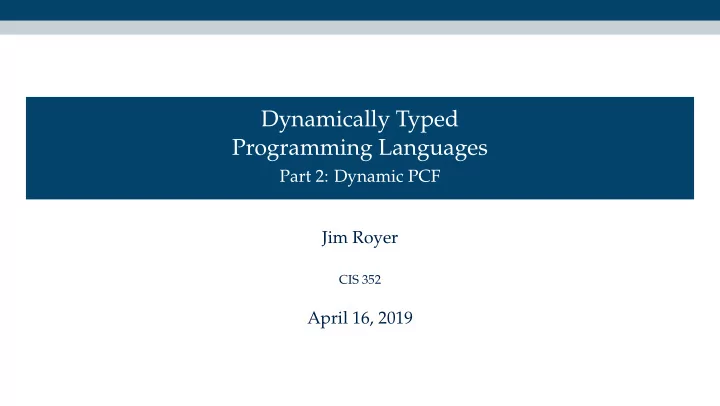

Dynamically Typed Programming Languages Part 2: Dynamic PCF Jim Royer CIS 352 April 16, 2019
Reference Practical Foundations for Programming Languages, 1/e, “Part VI: Dynamic Types” , by Robert Harper, Cambridge University Press, 2013, pages 127–148.
(Ordinary) PCF PCF (Programming Computable Functions) Plotkin 1977 A theoretical cousin of ML and Haskell (and close to LFP + ). PCF Raw Syntax Gordon Plotkin Expr :: = X | λ X . Expr | Expr ( Expr ) | N | zero | succ ( Expr ) | fix X is Expr | ifz Expr { zero ⇒ Expr | succ ( X ) ⇒ Expr } Note: For fix , think rec . Type :: = nat | Type → Type PCF Types: PCF Typing Rules: The usual thing.
Dynamic PCF DPCF Raw Syntax (the same as PCF syntax) Expr :: = X | λ X . Expr | Expr ( Expr ) | N | zero | succ ( Expr ) | ifz Expr { zero ⇒ Expr | succ ( X ) ⇒ Expr } | fix X is Expr DPCF Statics x 1 : ok , . . . x n : ok ⊢ e : ok asserts that e is a well-formed expression with free variables ⊆ { x 1 , . . . , x n } . However: ⊢ 3 ( 4 ) : ok is true but nonsensical (i.e., and error).
DPCF Dynamics Expr :: = X | λ X . Expr | Expr ( Expr ) | N | zero | succ ( Expr ) | ifz Expr { zero ⇒ Expr | succ ( X ) ⇒ Expr } | fix X is Expr DPCF “classes”: num and fun DPCF judgment forms Note: d is abstract syntax d val d is a (closed) value d evaluates to d ′ in one step d �→ d ′ d err d incurs a run-time error d isNum n d is of class num with value n d isNotNum d is not of class num d isFun (Fun x d) d is of class fun with value (Fun x d) d isNotFun d is not of class fun
DPCF Dynamics Rules Class checking ( Num n ) val ( Num n ) isNum n ( Num n ) isNotFun ( Fun x d ) val ( Fun x n ) ( Fun x d ) isNotNum ( Fun x d ) isFun ( Fun x d ) Transition ( �→ ) rules Zero �→ ( Num 0 ) d �→ d ′ d err ( Succ d ) �→ ( Succ d ′ ) ( Succ d ) err d isNum n d isNotNum ( Succ d ) �→ ( Num ( n + 1 )) ( Succ d ) err
DPCF Dynamics Rules, continued More transition ( �→ ) rules [See Harper for the five ifz rules] d 1 �→ d ′ d 1 err 1 ( App d 1 d 2 ) �→ ( App d ′ 1 d 2 ) ( App d 1 d 2 ) err ) d 1 isFun ( Fun x d ′ ) d isNotFun ( App d 1 d 2 ) �→ d [ d 2 / x ] ( App d 1 d 2 ) err ( Fix x d ) �→ d [( Fix x d ) / x ]
DPCF Dynamics, safety (such as it is) Lemma (Class Checking) If ( d val ) , then: either ( d isNum n ) for some n, or ( d isNotNum ) . either ( d isFun ( Fun x d ′ )) for some x and d ′ , or ( d isNotFun ) . Theorem (Progress) If ⊢ d ok , then either d val or d err or d �→ d ′ for some d ′ .
Static vs. Dynamic Typing In a statically typed language (e.g., Java, Haskell, . . . ) Type checking happens before run time. Errors such as 4 ( 3 ) get caught in type-checking. But you are stuck with the type-system of the language. In a dynamically typed language (e.g., Scheme, Python, . . . ) d ( d ′ ) may sometimes be just fine and other times an error (say when d has the value 4). Type/class checking happens in every step of running the program! This is a mild runtime overhead, but it complicates implementing and reasoning about programs a lot! But you get to make up (& enforce) your own type system with every program you write. Compromise position: Work in a language with a two-fisted type system.
Recommend
More recommend